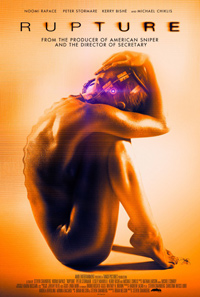Walking into Spiderwebs: Shainberg Returns with Characterless Genre Effort
 A decade after the somewhat unwarranted critical drubbing of Fur: An Imaginary Portrait of Diane Arbus (2006), Steven Shainberg breaks the silence with his first bona fide genre effort to date, Rupture. Working from a script by Brian Nelson (Hard Candy, 2005; 30 Days of Night, 2007), the Secretary director can’t seem to find his foothold in this vaguely attenuated sci-fi/horror oddity about a group of otherworldly entities masquerading as mad scientists engaged in brutal scientific experiments on carefully selected human subjects.
A decade after the somewhat unwarranted critical drubbing of Fur: An Imaginary Portrait of Diane Arbus (2006), Steven Shainberg breaks the silence with his first bona fide genre effort to date, Rupture. Working from a script by Brian Nelson (Hard Candy, 2005; 30 Days of Night, 2007), the Secretary director can’t seem to find his foothold in this vaguely attenuated sci-fi/horror oddity about a group of otherworldly entities masquerading as mad scientists engaged in brutal scientific experiments on carefully selected human subjects.
While such a synopsis, when mixed with the pedigree of its director and the noted cast (including headliner Noomi Rapace), would suggest a compelling venture, the end result is a somewhat derivative, inescapably bland combo of clichéd flourishes more apt to court comparison to more ambitious predecessors with similar depictions of menacing cults and their nefarious aims for ignorant recipients. Despite some initial promise in the inherently mysterious set-up, Shainberg’s latest foray eventually becomes a wearisome slog through a fairly predictable, undemonstrative finish.
Renee (Noomi Rapace) is a single mother living with her preadolescent son in a comfortable suburban home. A staunch arachnophobe, it’s apparent someone is watching mother and son from a variety of hidden cameras discreetly placed throughout her home. Dropping her son off on her way to a skydiving event, an insidious plot unravels when a coordinated blow out requires the assistance of a benign but chatty stranger, who becomes one of several kidnappers to tie her down in the back of a white van and drive her to an undisclosed compound cross country. Once arriving at the final destination, Renee is greeted by a team of doctors, including the crusty Dr. Nyman (Lesley Manville) and Dr. Raxlen (Ari Millen), plus a variety of other creepy characters, including Dianne (Kerry Bishe) and the Bald Man (Michael Chiklis), all who report to the unusually amused Terrence (Peter Stormare). Fawned at and pawed on, thanks to what the scientists consider to be unique properties of her skin (conjuring the essence of Venus Xtravaganza from Paris is Burning), it becomes clear Renee has been injected with something, and the screams from other prisoners throughout the compound allows her to deduce she will be forced to face her darkest fears in order to undergo a ‘rupture.’
We’ve seen any number of strange sects hiding out in isolated compounds, more often than not losing a bit of their mystique by the narrative’s belabored explanations of their intentions. Rupture, which valiantly attempts to churn its sterile, limited set pieces into subterranean mental ward chic, gets bogged down in too many extended sequences of discovery, including Renee’s attempted escapes through the air ducts, which allows her to see more of the strangeness going on in other rooms.
What emerges is more or less akin to the torture porn tendencies of Hostel (2005), or Pascal Laugier’s Martyrs (2008), which infamously depicts a group of bored elitists who mercilessly torture people in order to witness the ultimate ascension to martyrdom. The aim of Stormare’s crew, who we come to understand aren’t quite human (as depicted by eyes with multiple pupils hiding behind their custom contacts, while he also confirms “time moves differently for us”), is to make more beings like themselves, which requires a genetic mutation catalyzed by exposing subjects to whatever terrifies them. This transformation isn’t quite logically explained, but it kills nearly all of its subjects…except for Renee (and you can guess early on what she’s going to be tested with).
Although some of these sequences are decidedly gross and even unnerving, Rupture can’t quite conjure the ooginess (partially due to a budget dependent on less than satisfactory CGI) of something like A Cure for Wellness (2017), which similarly depicts ambitiously complex experiments on ignorant humans, or perhaps the more medically grounded Robin Cook novel Coma and its subsequent screen incarnations. Rupture depends heavily on the presence of Rapace, who dominates nearly every sequence, but since we never really get a sense of her character beyond a single mom in an unfortunate circumstance, her actions range from contradictory to sometimes nonsensical.
Considering the reputation Shainberg established in the realm of independent film in the early 2000s, Rupture is a rather disappointing return for the idiosyncratic director, and would have benefitted greatly with some more tightly honed characterization and less aimless wandering through a retrofitted office building which loses any sense of mystery thanks to overexposure and hand-fed explanations.
★★/☆☆☆☆☆


